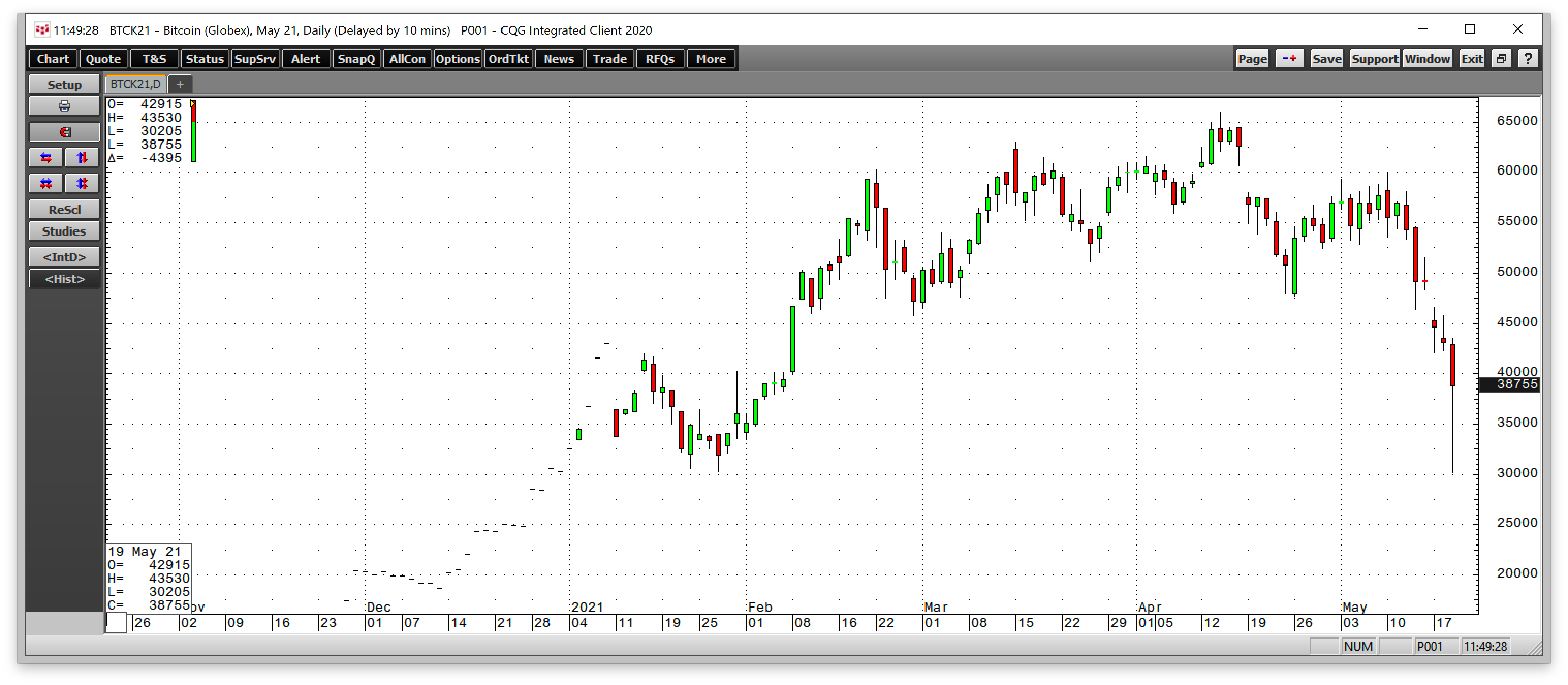This article was written exclusively for Investing.com
- Custody continues to be a significant issue
- The Colonial Pipeline fiasco highlights cybersecurity issues
- Carbon: Bitcoin gets Musked
- Easy money can be dangerous
- Digital currencies are changing the world, but it will take time
I have been trading in markets for a little over four decades and have never seen anything quite like the rise of cryptocurrencies. I became aware of the new asset class way back in 2010. In the age of modern technological innovation, eleven short years might as well be centuries.
When I first heard about Bitcoin, I viewed it as a next-generation video game. While I had enjoyed Atari’s Pong, Ms. Pacman, and Asteroids in college, I gave them up as I began working on Wall Street and raising a family. Mining for Bitcoin tokens seemed like an arcade game where hours of effort led to amassing worthless prizes.
Of course, Bitcoin prizes were anything but worthless. A $10 investment in that digital token in 2010 at five cents bought 200 tokens worth over $13 million at the recent high of more than $65,500.
As the market grew over the past ten years, I began to appreciate the power of blockchain technology. When Bitcoin reached $100, I believed it was a bubble. At $1000, I thought it was out of control. At $10,000, I realized I had missed the boat by not thinking outside the box.
As someone who appreciates and embraces a libertarian philosophy, Bitcoin and cryptocurrencies are the embodiment of the ideology.
While I have capitulated, realizing the digital currencies are here to stay, and the asset class’s market cap should continue to grow, three issues continue to pose roadblocks. Custody, cybersecurity, and carbon are factors that could hold the asset class back until the market can reach its full potential.
Bitcoin pulled back and more than halved in value from Apr. 14 through May 19. It's a sign that the leading cryptocurrency faces lots of hurdles as it strives to become a mainstream asset.
Custody continues to be a significant issue
While the younger generation has few problems with computer wallets, a large percentage of the investing public has more than a few concerns about wealth sitting in cyberspace in a wallet that cannot be kept in a purse or back pocket.
Storing cryptocurrencies via platforms like Coinbase (NASDAQ:COIN), Square (NYSE:SQ), or PayPal (NASDAQ:PYPL) provide some confidence. Still, the esoteric assets are far different than stocks, bonds, commodities, or traditional currencies, where there is the confidence that they will not disappear.
Custody is one of the primary factors that the asset class will be addressing over the coming months and years. Trust is critical for any investment or trading market. Horror stories about cryptocurrency fortunes lost when owners misplaced or forgot passwords are not doing the asset class any favors.
When exchanges, trading platforms, and financial institutions conquer the custody issue, it will be a giant leap towards advancing the cryptocurrency asset class.
The Colonial Pipeline fiasco highlights cybersecurity issues
In May 2021, the computer hack at the Colonial Pipeline that delivers crude oil and oil products to the east coast of the US wreaked havoc with {{954867|gasoline}} and other fuels. People began hoarding gasoline as they did toilet paper and other items during the height of the pandemic.
It appears that the owners of the pipeline capitulated and paid a ransom to the hackers. If the US, the world’s most powerful nation, cannot provide cybersecurity to a critical energy pipeline, it is not prepared to deal with computer hacks on the digital currency asset class.
The pipeline event leaves a bad taste in investors’ mouths as it highlights the potential for computer hacks of individual computer wallets or even exchanges that hold cryptocurrencies. Hackers in Russia, China, North Korea, and other regions have been aggressively going after systems.
The Colonial Pipeline is strategic for US national security. In 2014, the leading cryptocurrency exchange, Tokyo-based Mount Gox, experienced a hack where the perpetrators stole $460 million in Bitcoin from its holdings, sending the exchange into bankruptcy. In 2015, Bitcoin traded to a high of under $1000 per token. If the hack occurred on Apr. 14, at the $65,500 level, the loss would be over $30 billion.
The cybersecurity issues are another factor the digital currency asset class needs to address to move it further into the mainstream.
Carbon: Bitcoin gets Musked
It takes lots of energy to mine for Bitcoin and other digital currencies. Earlier this year, Tesla's (NASDAQ:TSLA) announcement that the company purchased $1.5 billion in Bitcoin and would accept the cryptocurrency as payment for its EV products pushed the price of the token into the stratosphere.
Tesla is a company that has thrived on the green energy revolution. Realizing that Bitcoin’s carbon footprint—particularly from Chinese miners consuming more and more thermal coal that generates power—was the antithesis of its EV philosophy, the auto manufacturing company did an about-face, suspending its plans to accept Bitcoin. The move pushed the leading digital currency lower.

Source: CQG
The chart shows that Bitcoin fell from $59,900 on May 10 to a low of $30,205 on May 17 after Tesla’s move. Bitcoin got Musked by Elon and his company. The market will now need to address the carbon issue as it has chased one of its leading proponents from the market.
Easy money can be dangerous
Easy money in markets can provide novice investors and traders with a false sense of security. Small investments made over the past decade turned into large fortunes, creating a magnetic force.
Adding to the speculative frenzy is the appearance of thousands of other cryptocurrencies. Nearly 10,000 cryptos are floating around in cyberspace. While many will turn into dust collectors in computer wallets, the payoff for investing in the “right” token will continue to cause capital to flow into the sector.
The best advice for those investing in cryptos is to use the money they can afford to lose. When it comes to trading, the most liquid digital currencies with market caps over the $1 billion level that offer tight bid-offer spreads are the only ones appropriate for trend trading to capture profits. As of May 19, only 88 of 9,945 coins, or just below 0.9% of the asset class, have at least $1 billion market caps and are trading candidates.
Many of the current cryptos are likely to fade into cyberspace’s abyss. Be careful when investing, and be prepared to lose every penny used to purchase these assets. Do not allow the stories of easy money to lull you into a dream state. The odds are against the individual investor in the highly volatile digital currencies.
Digital currencies are changing the world, but it will take time
Blockchain technology represents the technological evolution of financial markets. The record-keeping, speed, and efficiency created by blockchain have applications across all businesses.
Digital currencies reflect the growing ideology that government control of the money supply is over the top. Tidal waves of central bank liquidity and a tsunami of government-issued fiscal stimulus erode traditional currencies that derive value from the full faith and credit in the nations that issue the legal tender.
Supplies of digital currencies are mostly limited, while governments can print dollars, euros, yen, pounds, and other foreign exchange instruments to their heart’s content. Cryptocurrencies present a challenge to government control of the money supply, critical to maintaining political power. Do not expect governments to fold and allow the current crop of cryptos to take over any time soon.
China is working on its version of a digital yuan. The US and Europe will likely follow with digital dollars and euros, but as Chairman Powell said in April, they need to get it “right.”
The bottom line is the digital currency revolution has arrived, but it will take time. When it comes to the thousands of cryptos out there in the market today, expect the pecking order to change constantly, leading to a far different structure in the coming months and years.
Custody, cybersecurity, and carbon are three issues facing cryptocurrencies. Meanwhile, control of the money supply is a substantial issue for government regulators and legislators. Concerns will continue to rise with the market cap of the overall asset class.
